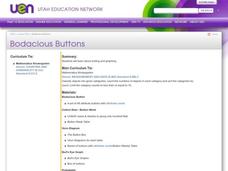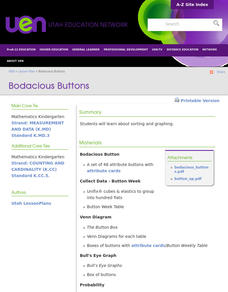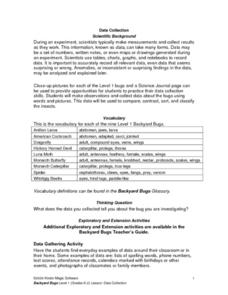Curated OER
Ready for Roots
Fourth graders sort seeds and predict what conditions are needed for them to germinate. They keep the seeds moist, observe and measure their growth and graph the results. As the seeds start to grow students compare and contrast the each...
Curated OER
Graphing Favorite Fruit
Third graders take poll and sort data, enter the data to create a spreadsheet and create bar and pie graphs.
Curated OER
Hardware Sort
Students work in groups to sort and classify a variety of hardware materials commonly found in the store. Students discuss attributes and explain their reasoning for different classifications.
Curated OER
Descriptive Statistics
Students demonstrate how to use frequency and scatter diagrams. In this statistics lesson, students are introduced to different techniques of representing data. Students sort and graph data on a worksheet and use a frequency diagram to...
Curated OER
Awesome Animals
Students collect data from classmates about their favorite animal. They use the ClarisWorks graphing program to enter data, graph results, and interpret data.
Curated OER
Missing Macroinvertebrates - Stream Side Science
Field study groups collect samples of stream water and identify the macroinvertebrates found. Using their data, they calculate a water quality index to rate the health of the stream. They graph their data and discuss the value of a water...
Curated OER
Wetland vs. Stream Macroinvertebrates
A link to a comprehensive macroinvertebrate guide gives you the information needed to prepare for this field study activity. Sample macroinvertebrates are collected from areas representing different environmental conditions. Junior...
Curated OER
The Three M's of Statistics: Mode, Median, Mean
Young mathematicians use the Visual Thesaurus to define mean, median, and mode. In this mean, median and mode activity, learners use online sources to find the definitions of mean, median, and mode before applying the concepts to a class...
Howard Hughes Medical Institute
Color Variation over Time in Rock Pocket Mouse Populations
A species-specific look at natural selection, the resource herein examines how adaptations have helped the population of rock pocket mice survive in a changing landscape. To begin, middle or high schoolers watch a 10.5 minute video,...
Curated OER
Insects?
Can you tell the difference between a bug and an insect? Aren't they the exact same thing? Let your learners explore, identify, classify, and document the differences they see in bugs and insects. The activity sheet suggests several...
Alabama Learning Exchange
Jelly Beans Add Up
Students explore counting, sorting, and graphing skills. In this data analysis lesson, students sort jelly beans by color, count the jelly beans, and create a bar graph of the jelly beans according to color.
Curated OER
Wonderful Watermelons
First graders explore watermelons and collect and sort their seeds. In this watermelons lesson plan, 1st graders read the story Down By The Bay and then weigh, measure, collect seeds, sort, and eat their watermelon.
Curated OER
Displaying Data
Learners create a display map with data from a previous lesson. They incorporate graduated marks that identify areas of the school grounds that are good for planting based on density.
Curated OER
Bodacious Buttons
First graders graph a data set. Given a set of buttons, 1st graders sort them into categories using specific attributes. They graph the number of buttons in their set based on their attributes using a variety of graphs. Students share...
Curated OER
Worm Bin Project Data Exchange
Students work collaboratively to exchange data with their peers (groups of students at other schools) about their worm bin project. They discuss differing findings and hypothesize reasons for these differences.
Curated OER
Bird Probability
In this bird probability learning exercise, students complete 12 different problems and short answer questions related to various types of birds. First, they determine what types of birds live in their forest by using the given table to...
Curated OER
Bodacious Buttons
First graders participate in games, graphing, and probability exercises to sort and graph buttons. They sort buttons with Venn diagrams and Bull's Eye graphs.
Curated OER
Applied Science - Built Environment Lab
Young scholars evaluate trash. For this Science lesson, students collect and weigh trash from their classrooms. Young scholars categorize the trash and the corresponding weights, recording the information on a data sheet.
Curated OER
Details, Details
Students explore statistics by participating in a personal details activity. For this data collection lesson, students identify the importance of personal information collection and how it can be used against them if collected illegally....
Curated OER
Science: Backyard Bugs Data Collection
Students practice data collection skills by observing common bugs found in their local environment. Once the data is collected they complete data sheets to compare, contrast, sort, and classify the insects. The lesson includes...
Curated OER
Graphing Pendulum Results
Sixth graders set up a pendulum experiment deciding which variable to manipulate (length of string or weight on the string). They create a hypothesis, collect necessary equipment, and write out each step of their experiment. They then...
Curated OER
Great Tasting Shapes
Fifth graders investigate the concept of median, mode, and range using a simple model for display purposes. They examine different shaped crackers out of a box and identify the ones that occur the most. Then the calculations for the...
Curated OER
Tallies Tell It All
Students count a number of objects and create a tally with groupings of five to illustrate their total. They identify a number of things both at school and at home that can be counted with tallies and create appropriate tallies for each.
Curated OER
The M&M's Brand Chocolate Candies Counting Book
First graders use estimation skills and gather data and record their findings

























